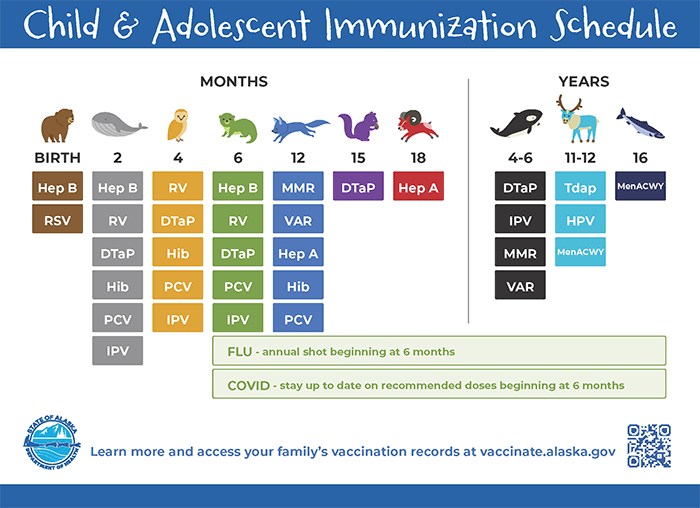On this page:
Where to find vaccines
Vaccines are widely available in Alaska at no cost or low cost, regardless of your insurance status. If you have a provider you see regularly, you can schedule an appointment to talk about vaccines you and your family may need — and to get vaccinated. Many pharmacies offer walk-in vaccinations, with no need to schedule ahead of time.
For people with private health insurance - most insurance plans cover recommended vaccines when provided by an in-network provider. Check if your provider or pharmacy is in-network.
If you don’t have health insurance — or your plan’s out-of-pocket costs for vaccines aren’t affordable — you can get vaccinated at a lower cost or for free. Public Health Centers and Federally Qualified Health Centers use an income-based sliding fee scale. No one is denied services due to inability to pay.
Tribal Members
Military
Need help making a vaccine appointment?
Give babies a healthy start
Immunization is one of the best ways to give children a healthy start and help protect their health throughout their lives.
Vaccines during pregnancy help protect you from illness and the antibodies you create are transferred to your baby to keep them healthy during their first months. The following vaccines are recommended during pregnancy:
-
Tdap (tetanus, diphtheria and pertussis)– A Tdap vaccine is recommended during each pregnancy, ideally between weeks 27 and 36. Getting Tdap helps you share antibodies with your baby before birth to prevent whooping cough (pertussis).
-
Flu (influenza) - A flu shot is recommended if you are pregnant during flu season. The flu shot is safe and effective during any trimester.
-
RSV (respiratory syncytial virus) – There are two options to help protect your baby during RSV season (typically September through March): you can get the RSV vaccine during weeks 32 - 36 of your pregnancy, or your baby can get an RSV immunization at birth.
-
COVID-19 - Staying
up to date on COVID-19 vaccines is recommended during pregnancy. It is safe to receive a COVID-19 vaccine any time during pregnancy.
Learn more about
vaccines during pregnancy from the American College of Obstetricians and Gynecologists.
Vaccines help babies build immunity so they’re protected from many diseases as soon as possible in life. A simplified childhood immunization schedule is below. Click to download a printable PDF. Talk with your child’s health care provider to schedule well-child visits and vaccinations. If you miss a vaccine dose, try to catch up as soon as possible.

Vaccines for adults
Vaccines can protect people of all ages from serious diseases. By getting recommended vaccines, adults reduce their risk of getting sick and help protect others around them who are vulnerable.
Vaccines recommended for all adults:
-
Tdap vaccine - recommended every 10 years; a dose is also recommended during every pregnancy to help prevent whooping cough in babies
-
Flu shot – every year
-
COVID-19 vaccine – stay up to date on
recommendations
Some adults may be recommended to receive other vaccines based on age, health conditions, job, lifestyle or previous vaccination history. Ask your health care provider what vaccines are recommended for you. These can include:
-
HPV vaccine (through age 26 years) – recommended to prevent HPV cancers, if not fully vaccinated previously
-
Hepatitis B vaccine – recommended to prevent hepatitis B, if not vaccinated previously or at higher risk
-
Zoster vaccine (50+ years) – recommended to help protect against shingles
-
RSV vaccine (60+ years) – helps prevent respiratory syncytial virus
-
Pneumococcal vaccine (65+ years) – protects against pneumococcal disease that can cause some types of pneumonia
How to get vaccination records
There are two ways to get a copy of Alaska immunization records:
- Request records through your health care provider.
Detailed instructions available at
vaccinationrecords.alaska.gov.